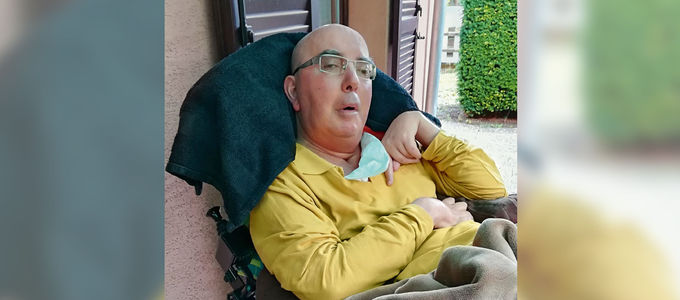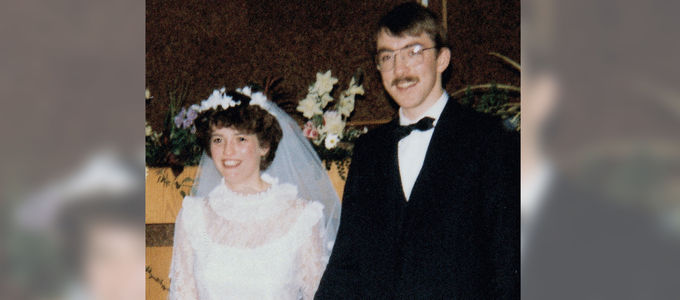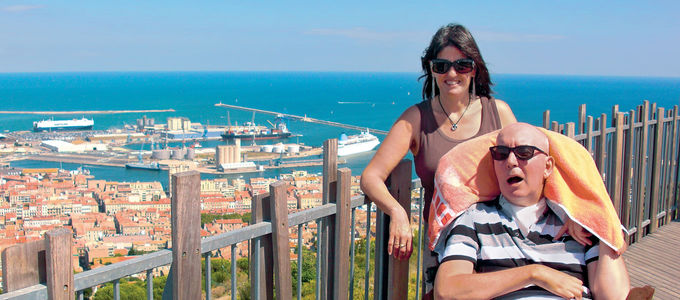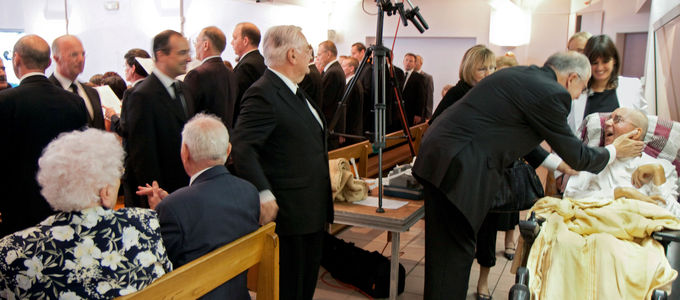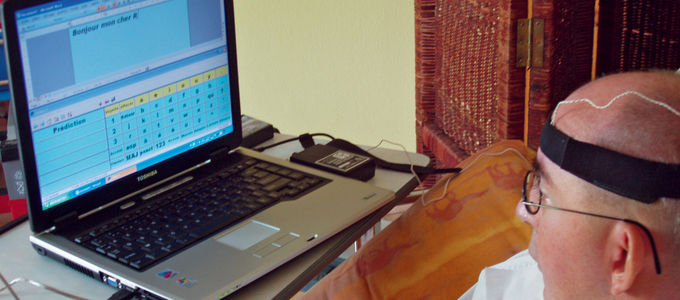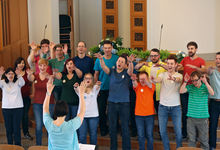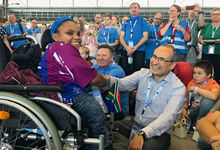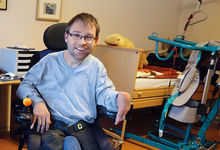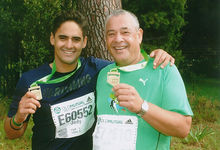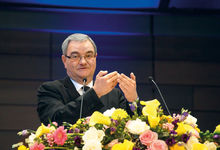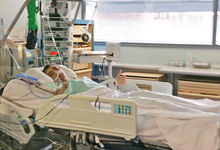Trapped inside his own body
“The only thing that lives on in me is my heart, my soul, and my eyes,” Philippe says, who has suffered from locked-in syndrome for 34 years. He gives us a glimpse of his faith, his freedoms, and his very personal bonus programme.
When the authorities announced lockdowns and restrictions on account of the coronavirus pandemic, it was a deep encroachment on the personal freedom of many. In fact, many were not even able to leave their homes any more without a good reason. Philippe Leidecker, a Frenchmen and brother in faith, knows only too well what it feels like to be locked in. Only, he is not trapped in his own house, but in his own body. And this has been the case for 34 years. He suffers from a rare condition called locked-in syndrome (LIS), caused by a car accident. He is completely paralysed. All he can move are his eyes. But his mind is wide awake, his trust in God is unbroken, and he has a great sense of humour.
Complete paralysis
Two and a half weeks after the accident, Philippe woke from his coma. “I came back from nowhere, where I had been surrounded by light and felt very safe,” Philippe describes his comatose state years later. “I was filled with a deep peace. In spite of my situation I felt very happy. The Lord gave me a sign that He was at my side: the first person I saw standing by my bed was our then District Elder Henri Higelin.”
When he woke up, Philippe was able to see, hear, and feel everything. He was able to assimilate what was happening around him, but he was unable to move, speak and eat or even breathe himself. “I felt like a mummy, like the living dead. The only thing that was alive in me was my heart, my soul, and my eyes.” When the doctors explained that he was suffering from locked-in syndrome and what it meant, he found the word dreadful. “It sounded so foreign in my ears. Like something that had nothing to do with me… but has been a reality for me ever since.”
Heart, soul, and eyes are alive
At the time of the accident, Philippe was in the prime of life. Three years before, he and Béatrice had been married. Their son Jean-Loup had just been born. Philippe had a job as a lathe operator, and in his congregation he was a Deacon and the youth leader. He took the young people’s hearts by storm. Wherever he went he made people laugh and was the life and soul of every gathering. But deep down this fun guy was a very sensitive young minister. “He had an eye and a heart for the weakest among the young people. Everything he did was backed by great faith and boundless love for the youth,” his then district youth leader attests. The members were very shocked when they heard about his accident and began to pray deeply for the young Deacon. Béatrice too prayed to God over and over and entrusted her worries and fears for her husband to God.
Philippe learned to communicate by eye movements and blinking. At first he could only respond to yes-no questions. During his rehabilitation, Béatrice had an idea: she recited the alphabet to Philippe until he blinked at the right letter. “That was revolutionary for Philippe. He was finally able to communicate. It opened unexpected horizons. He was able to break out of his silent world,” Béatrice says. For some time, he also used a special computer programme that he could control with his eyes, but it tired him out so that he prefers to communicate via the analogue system: “I prefer to speak directly with people rather than using my device,” he says.
His strength: his family and his faith
Philippe derives special strength from spending time with his wife and his two sons. “The happiness I feel during our conversations is indescribable. They are a source of strength. It is as if a tiny window opens up to let light into my inner prison.” There is only one thing he regrets: “I cannot hug them, which is incredibly difficult to accept for me.”
One must not make the mistake and believe that Philippe does not lead an active life. From time to time, he accompanies one of his caregivers when she gives classes at a nursing school. He loves to listen to music during his daily routines: the Boléro by Ravel, Bach, or something by Mozart. He watches TV, has books read to him, and dictates short letters to friends, ministers, or other locked-in patients.
After a heart attack in 2016, Philippe’s condition deteriorated. He is often tired and he finds it hard to concentrate and express his thoughts. At the beginning of the coronavirus pandemic, he made it clear that should he come down with the virus he does not want to be admitted to hospital. He wanted to leave the few ventilators there were to other patients. He is not depressed, he says. He is merely a realist.
He has not lost his humour, though. “On days when he feels good he still manages to joke around and delight the people around him,” his wife reports. His grandchildren are a great factor in contributing to his joie de vivre: Philippe is the grandfather of twins. They live nearby and visit him regularly. Right now they don’t come into the house, but wave to him from outside.
A bonus: the video services
Philippe’s faith is still rock solid. The coronavirus crisis even had a positive effect for him: since then he has been able to watch livestreams of divine services every Sunday. Normally, he listens to the services on the telephone. But he did miss Holy Communion, he says. Right on the first Sunday, when this was possible again, his brother-in-law Yves, a Priest, came to celebrate Holy Communion with him. That was very special, Béatrice writes. The consecrated wafer is dissolved in water for Philippe and is given to him in liquid form via his stomach tube.
It means so much to Philippe to be able to actually watch the divine services and not only hear them. He hopes that this will continue. “Of course the fellowship is not the same as being at church—which I cannot attend any more, unfortunately. But these services over the Internet were a real bonus for me. Having the Lord in my room through His servants was very special for me!”
Facts:
Locked-in syndrome is caused by damage to specific parts of the lower brain and the brainstem. Possible causes are strokes, aneurisms, and traumatic brain injury. But also degenerative diseases, as was the case with Stephen Hawking who died in 2018, can lead to the paralysis of nearly all voluntary muscles and the ability to speak. The condition is first mentioned in literature in Alexandre Dumas’ novel
from 1844, where it says about Noirtier de Villefort, father of Napoleon Bonaparte’s deputy prosecutor, who had had a stroke: “Sight and hearing were the only two senses which, like two sparks, still lit up this human matter, already three quarters moulded for the tomb.”
For a long time, the disease was subsequently known as the Monte Christo syndrome. It was not medically defined until the early Sixties of the twentieth century, when it was given the name it carries today. By definition patients are completely paralysed and are not able to speak or swallow. They are fed via a stomach tube. The patients are conscious and aware, with no loss of cognitive function.
This full-length version of this article appeared in the German-language magazine Unsere Familie issue 16/2020.
Article info
Author:
Date:
Keywords:
Dinara Ganzer,
Danièle Idler,
Tim Rosar
12.10.2020
France,
Congregational life,
People/Personalities


